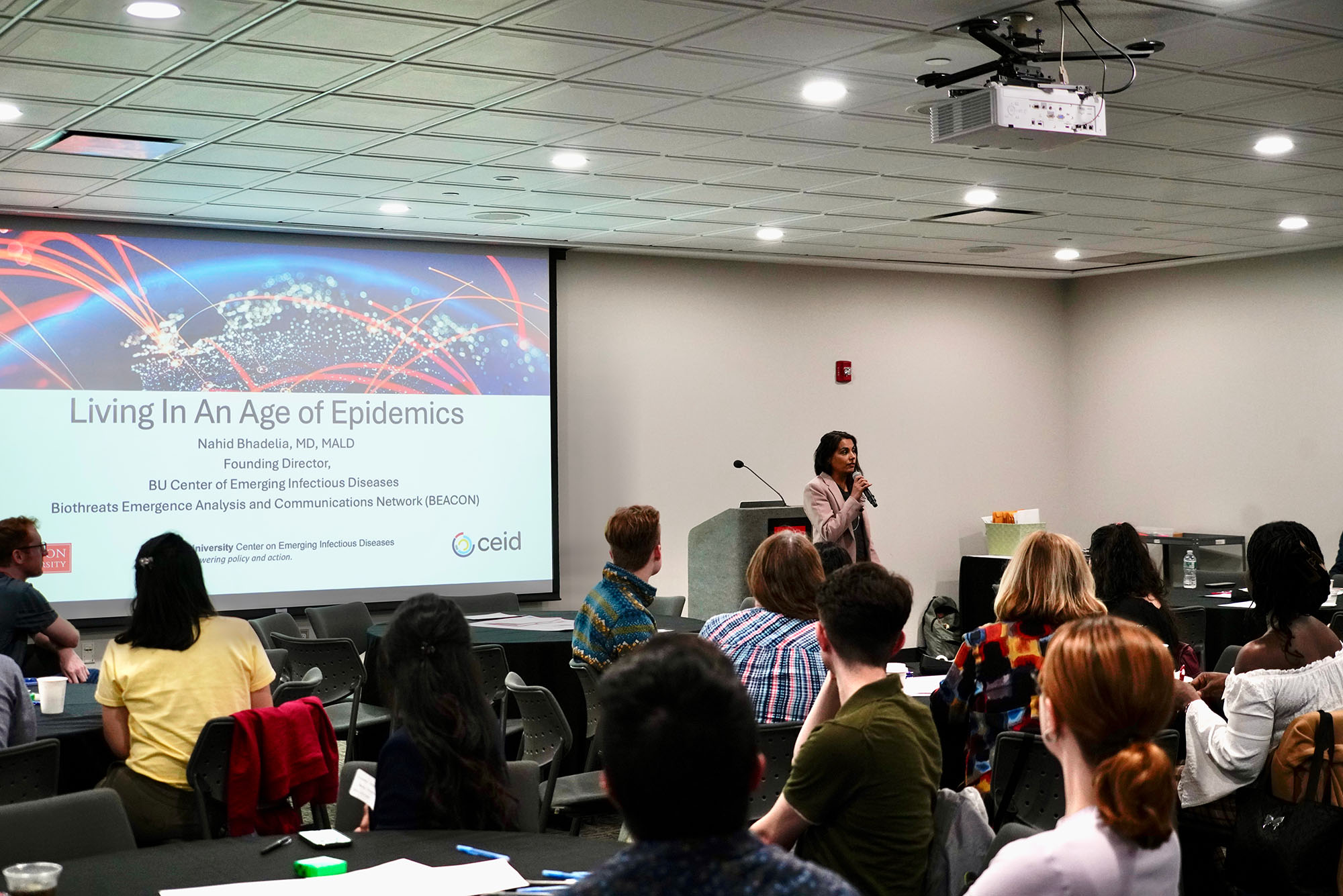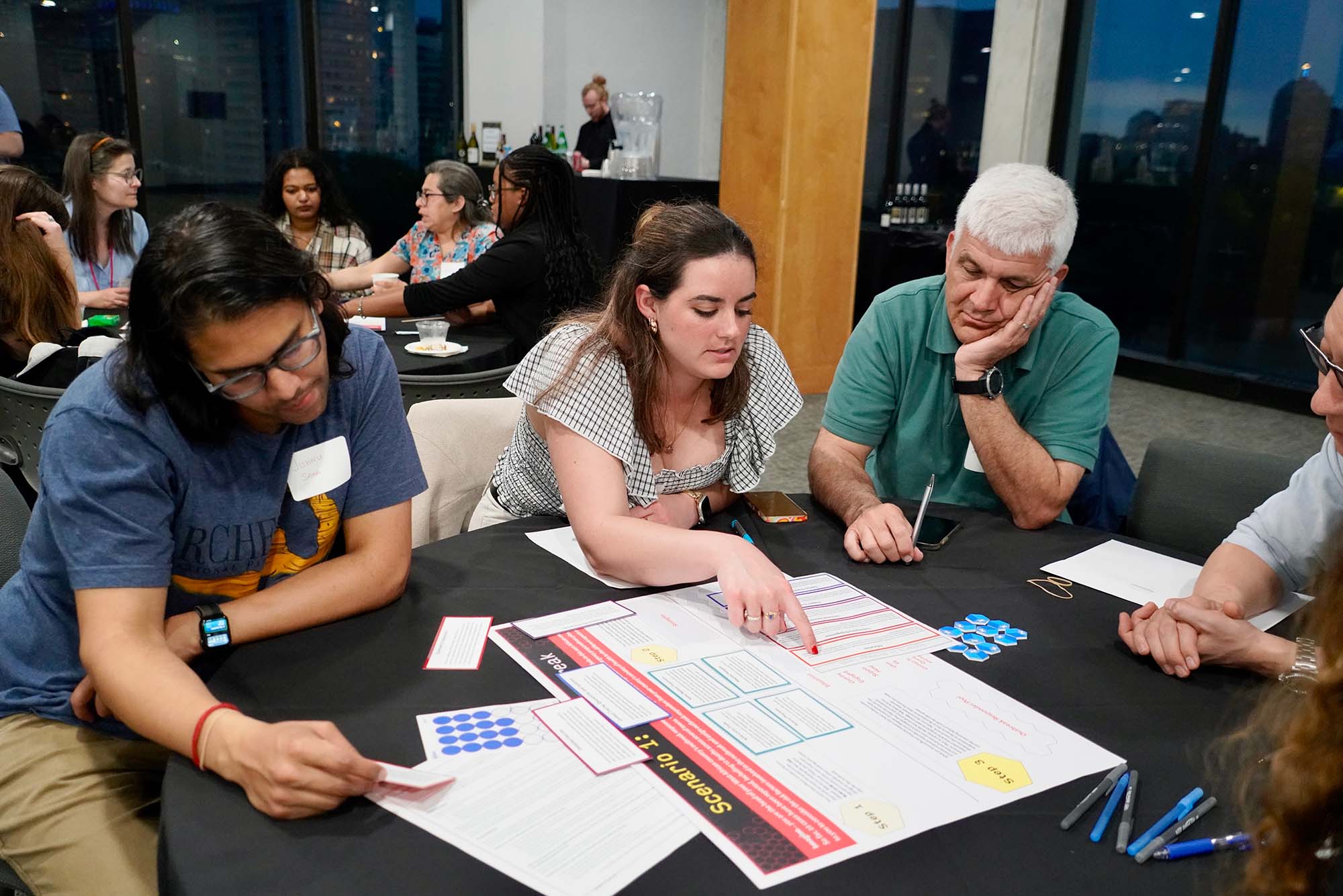What’s It Like to Be an Infectious Diseases Outbreak Responder?

BU infectious diseases researcher and physician Nahid Bhadelia leads the Outbreak: Epidemics in a Connected World event.
What’s It Like to Be an Infectious Diseases Outbreak Responder?
In a public education event at Boston’s Museum of Science, BU’s Center on Emerging Infectious Diseases experts empower people to make tough decisions
It’s after-hours in Boston’s Museum of Science and 100 people are about to be given an urgent mission. Boston University infectious diseases expert and physician Nahid Bhadelia tells everyone that, in a world riddled with diseases emerging and spreading, “you are all outbreak responders.” And in that moment, she meant it literally. Inside that room, attendees—including myself—sat at round tables, ready to make decisions about mock outbreak scenarios and discuss how to solve some of the most complex problems in infectious diseases management.
The Outbreak: Epidemics in a Connected World event was a public, interactive forum presented in partnership between the museum and the BU Center on Emerging Infectious Diseases (CEID). Bhadelia, founder and director of CEID, led the discussion and shared insights about global disease surveillance, her experience working to contain multiple Ebola outbreaks in West Africa, and how our changing world puts more people at risk of contracting emerging pathogens.
“We can’t predict entirely where the next outbreak is going to emerge because of how our world is changing,” she said during her presentation. Bhadelia pointed out how the loss of wetlands and natural habitats brings wildlife closer to people and domestic animals—which is how wild birds spread the H5N1 bird flu strain to dairy cows. And most countries in the world, she added, have limited access to diagnostic technology necessary to detect emerging diseases, raising questions about how infections are spotted in the early stages of an outbreak when containment measures are most effective.

“Does the world need more technology, or more empathy?” asked one of the participants. Bhadelia, a BU Chobanian & Avedisian School of Medicine associate professor of medicine, responded without hesitation: “Empathy without a doubt. We have a lot of silver bullets and solutions with no way of distributing them equitably.” For example, during the COVID-19 pandemic, the United States and many wealthy nations stockpiled lifesaving vaccines, while lower- and middle-income countries did not have enough.
After her presentation, attendees were thrown into two mock urgent outbreak scenarios: containing Ebola and limiting the spread of H5N1. On each table were fact and resource cards with details about how people are getting sick, the disease severity, and the available solutions, as well as large posters outlining a step-by-step approach to decide what to do about it. As a team, participants discussed the importance of key facts: What stage of the outbreak are we in? How are hospitals and medical workers fairing? Where are the hot spots of the disease? What are the risk factors? Then, they had to decide where to allocate resources to control the outbreaks: investing in environmental projects to limit animal-human spillovers, distributing personal protective equipment for hospitals, engaging with community leaders, educating the public, or developing vaccines.
“It’s really cool to see people so deeply engaged,” said David Sittenfeld, director of the museum’s Center for the Environment, who hosted the event. “When it comes to these complex problems at the intersection of human biology, policy, and the environment, we all tend to defer to experts and thought leaders, but we all have decisions to make, and everyone has values to contribute to enrich societal decision-making.”
When it comes to these complex problems at the intersection of human biology, policy, and the environment, we all tend to defer to experts and thought leaders, but we all have decisions to make, and everyone has values to contribute to enrich societal decision-making.
In a room overlooking the sparkling Boston skyline, my table of six people got a taste for what it’s like to be an outbreak responder. We decided that the most urgent needs, in our hypothetical situation, were community outreach and equipping hospitals with protective equipment. Bhadelia and Sittenfeld seemed to agree with our choices.
“It’s wonderful to see others who care, and who would take a night out of their life to participate in this,” said Nina Levin, one of my teammates. She brought to the event five members of Massachusetts Female Friends Over 50 (MFFOF), an active meetup group with over 17,000 members.
“I was a science teacher and this is an activity I would have done with my students,” said Elise Coughlin, who came with the MFFOF group. “It’s important to understand the implications of communication, education, resource allocation, teamwork—all of this was brought up in the two exercises. It’s amazing thinking about how money should be allocated, when there’s just not enough of it. When it comes to the health and welfare of animals and people, that should be of the utmost importance.”

Nima Darafshi, a BU School of Law graduate admissions counselor, came to the event because of his curiosity and desire to learn more about outbreak prevention. “This was a really engaging and insightful experience,” he said. “Especially sharing my perspective and learning from the participants at the table. I really enjoyed being able to put this information into context. Now, I know how to apply pressure and engage in my community to make sure people are more informed about outbreaks.”
The forum was a part of the museum’s Being Human series that explores, through exhibits, films, and experiences, how we’re all connected. CEID and the museum have an ongoing partnership that will bring BU expertise to featured exhibits and panels. Later this year, it’s anticipated that a new museum exhibit will feature CEID’s artificial intelligence–powered Biothreats Emergence, Analysis and Communications Network (BEACON), a first-of-its-kind platform that monitors and analyzes infectious diseases threats around the world. Bhadelia’s goal is for the recently launched platform to become a global hub for sharing information about outbreaks to, hopefully, keep more people safe.
“Events like the outbreak forum show the complexity of preparing and responding to emerging infectious threats, including scientific uncertainty and [making] real-life decisions about resources and impact on many different elements of society,” Bhadelia told The Brink after the event. “They also help engage scientists, public health experts, and community members in dialogue, hopefully improving trust and understanding. These types of events are integral to CEID’s mission.”

Comments & Discussion
Boston University moderates comments to facilitate an informed, substantive, civil conversation. Abusive, profane, self-promotional, misleading, incoherent or off-topic comments will be rejected. Moderators are staffed during regular business hours (EST) and can only accept comments written in English. Statistics or facts must include a citation or a link to the citation.